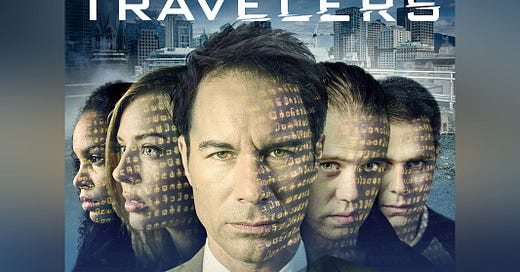Wanna save the world? Give me your consciousness
The world is ruined. Let’s travel through time. We’ll save the world. Maybe.
Trevor Holden: You know, most belief systems are just a shared vocabulary for people in search of meaning. I think maybe the important thing is to just believe in something.
Abigail Paris: You mean something spiritual?
Trevor Holden: Something.
Abigail Paris: I don't believe in anything.
Trevor Holden: Yeah, you do. You believe in humanity. You believe that our future's at stake.
Abigail Paris: That's not spiritual.
Trevor Holden: Yeah, it is.
The TV series Travelers (Showcase&Netflix showrunner Brad Wright, 2016) hadn't been on my radar since last February. And yet there is talk of consciousness transfers, time travel, apocalyptic scenarios. Damn, I thought, how could I have missed Travelers? Well, it’s a first class science fiction and mystery show. At least for me. It is sparks of inspiration in motion in a dark setting. Red and black emotions from the very first scene.
Pillars of the show:
The Travelers.
The Big Plan.
The Director behind the Big Plan.
Old school Sci-Fi
Travelers setting is classic: A future where humanity is dying out and living under domes; nanotechnology that can save people and rebuild organs and tissues; technology that can run a quantum supercomputer that can calculate a strategy to save the world (the Big Plan). In short:
time travel;
post-apocalyptic scenarios;
connection of different timelines;
many worlds.
Emotionally, you are a bit haunted by the specter of impending destruction and the threat of apocalypse. And you have a feeling that there may be a time paradox in store for you, which is also a classic. But even though it’s about time travel, the biggest paradox you’ll face is not about time. It’s about consciousness.
The Paradoxes of Consciousness
But what is consciousness? Is it just implicit identity? Soul? Mind? Spirit? Subatomic Brain? In philosophy, consciousness is defined as “intuition”, and this intuition leads to direct knowledge of existence. So, when consciousness is not trapped by pathologies or personality disorders, we know that we exist, and we come to know it not by reasoning, but by an intuition of existence. Consciousness is beyond logical and rational intelligibility. It transcends our body. I exist, says my consciousness. So, am I my consciousness? Or is my consciousness just a container for ethical and moral values?
Hmm. This is hard. Too much for me, but maybe you have some answers.
Numbers
The first thing you notice about Travelers is the numbers. There are numbers everywhere. Mathematics? Abstractions? Physics? My receptors were on fire. I want to understand, I said to myself. The gist is: There is a “Director” who selects the “Travelers” (who are identified by a four-digit numerical code) to send them in the past. The main mission is to save humanity from a series of terrible catastrophes through many smaller missions. Although the Travelers active in the planet-saving operation actually number in the thousands, there are five main characters in the show:
Traveler 3468
Traveler 3569
Traveler 3465
Traveler 0115
Traveler 3326
Almost immediately, we learn that they are such military and paramilitary professionals. They are a team. They are friends. In one case, there is a relationship. And all the teams sent in the past by the Director have the same players: the leader, the doctor, the engineer, the strategist, and the historian; trained to know a great amount of information about past events and situations.

T.E.L.L.
To move through time and space, the Travelers use the T.E.L.L.: Time, Elevation, Latitude, and Longitude. The Director can take this data off the digital network (which is why no Traveler was sent before the cell phone era). T.E.L.L. is an ingenious data system that allows them to travel back in time by anchoring their consciousness to a “host body”. Each host is a person about to die. We are given this information with an eerie countdown in red that consumes a few seconds in a scene that announces the end of a life. Possible suicides, victims of murder or accidents begin to writhe and scream as their bodies are invaded by the consciousness of their assigned traveler. Not to save them, but to kill them. Or perhaps not to kill. Here is one of the paradoxes of consciousness that we immediately face: What really changes? Every host body consciousness has been replaced, but the body is still there. Are they alive or dead? According to the world, they’re alive, because that's how they are perceived.
Consciousness transfer
So the travelers “enter” these bodies through a transfer of consciousness. Transfer of consciousness? We don't have the technology to do this yet, but we're not that far off. They've been trying for a long time. Consciousness taken out of a body and put into a "host". This can be another body or something bio-mechanical, like a robot shell. That's it? I can be in another body and nothing changes? Upon relocation, the five travelers assume five time/place identities:
Grant MacLaren (Traveler 3468). He is the leader of the team and assumes the life of a married FBI special agent.
Marcy Warton (Traveler 3569). She is the team's doctor and assumes the life of a mentally disabled woman.
Carly Shannon (Traveler 3465). She is the team's tactician and takes on the life of a stay-at-home single mother.
Trevor Holden (Traveler 0115). He is the team's engineer and one of the oldest people to take on the life of a high school athlete (I have to say, I loved this character).
Philip Pearson (Traveler 3326). He is the team historian and takes on the life of a young heroin addict.
Do people change or do they reveal themselves?
If my consciousness is transferred to another body, it means that I am taking over its physical identity and therefore its life. So the Travelers of the show connect to a network of relationships, but even though they’ve found information about their hosts through the web and social media, they soon find out that they can't make sense of that information, and that’s a fascinating reflection that the show suggests: What do we really know about each other? We are not mind-readers. We know external information, so to speak, what rises to the surface, but what do we know about others’ consciousness? Smiling, crying, reacting are surface forms of deep being. I may know things about others. But the value of this information becomes concrete only in the relationship I can create with these people. How often have we thought someone had changed? Well, people do not change, they reveal themselves.
The 6 protocols
In episode after episode, it turns out that the Director (the big brains behind the plan to save the world) has made mistakes. He/It was not so accurate in identifying the right hosts, mostly because he/it is not a human being. He/it is a quantum computer run by an AI, and views data not in relation to people and their social-emotional behavior, but in relation to other data. So there is a problem with the data held by the control system, and it is easy to see why, it is about the gap between virtual fiction and real life. So the Travelers are caught in relationships they cannot read because their consciousness is alien to the real life experiences of the host bodies. They are also bound by the six rules imposed by the Director:
Protocol 1: The mission comes first.
Protocol 2: Leave the future in the past.
Protocol 3: Don’t take a life, don’t save a life, unless otherwise directed. Do not interfere.
Protocol 4: Do not reproduce.
Protocol 5: In the absence of direction, maintain your host’s life.
Protocol 6: Do not communicate with other known travelers outside of your team unless sanctioned by the Director.
Do you want to save the world? Give me your consciousness.
Do you want to save the world? Follow the protocol.
Now, I have been thinking about these protocols. Every one of them. And they seemed very familiar. And you? Don't these protocols seem familiar to you?
Thanks for reading!
More Time Travel TV Shows
A.J.'s Time Travelers (1994)
The Crossing (2018)
Fringe (2008-2013)
Outlander (2014)
Seven Days (1998-2001)
Lost (2004-2010)
Many others…






Enjoyed this a lot, Michael. I'd glazed over the show because the poster thumbnails on Netflix made it look not my kinda thing. But my interest is piqued from your description here.